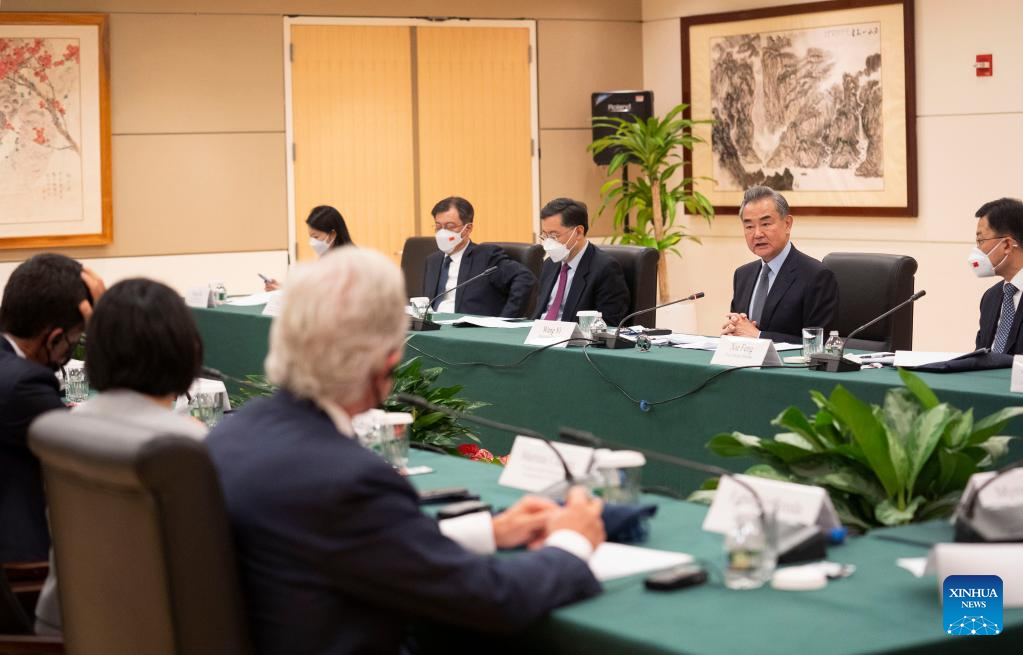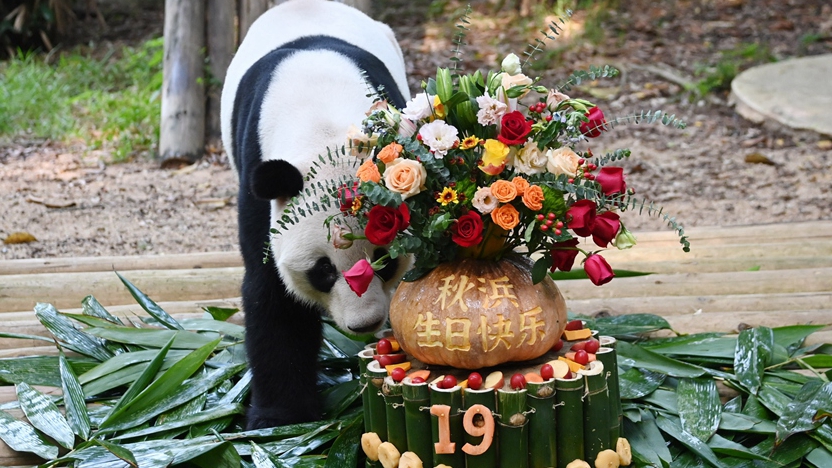Chinese FM on China's self-development, certainties of U.S. policy

Chinese State Councilor and Foreign Minister Wang Yi (2nd R) meets with representatives from the National Committee on United States-China Relations, the U.S.-China Business Council and the United States Chamber of Commerce in New York, the United States, Sept. 19, 2022. (Xinhua/Liu Jie)
NEW YORK, Sept. 20 (Xinhua) -- Chinese State Councilor and Foreign Minister Wang Yi on Monday met with representatives from the National Committee on United States-China Relations, the U.S.-China Business Council and the United States Chamber of Commerce.
Wang said that the world today is far from peace, as the COVID-19 pandemic has yet to end, and the Ukraine crisis was once again inflamed.
Considering the China-U.S. relationship is now at a low ebb since the establishment of diplomatic ties, many people are concerned that the two countries are entering a new Cold War, he said.
Against the current decline in certainties and the rise in uncertainties over the prospects of China-U.S. ties, Wang elucidated five "certainties" about China:
First, the prospects of China's own development are certain, he said, noting that the upcoming 20th National Congress of the Communist Party of China will plan and formulate the next development blueprint and goals of the country.
The Chinese economy possesses enough scale and resilience. In China's endeavor to realize modernization, more than 1.4 billion people are striving toward common prosperity, which will provide more market and development opportunities for countries around the world, including the United States, he said.
Second, China's resolution in reform and opening-up remains certain, Wang said, noting China will continue to deepen its reform, open wider to the world, establish a new system for higher-level openness, build an open world economy, and further promote economic globalization.
Third, China's policy toward the United States is certain, Wang said. China and the United States have different systems, which are chosen by their own people, he said, adding that the two countries can neither substitute nor defeat one another.
Chinese President Xi Jinping put forward the three principles of mutual respect, peaceful coexistence and win-win cooperation between China and the United States; and U.S. President Joe Biden has repeatedly emphasized that the United States does not seek a new Cold War with China, that it does not aim to change China's system, that the revitalization of its alliance is not targeted at China, that the United States does not support "Taiwan independence" and that it has no intention to seek a conflict with China, Wang said.
The key is that the United States should return to a rational and practical China policy at an early date, he said.
Fourth, China's attitude of continuing to strengthen economic and trade cooperation between the two countries is certain, Wang said, adding that China welcomes the development of U.S. enterprises in China and will continue to provide a market-oriented, internationalized and legalized business environment.
Wang noted that China-U.S. economic and trade cooperation should do more addition instead of subtraction, join hands instead of letting go of each other's hands, and tear down walls instead of erecting walls.
For their respective concerns, he added, the two sides should hold talks instead of confronting each other, negotiate instead of coercing each other. He urged the U.S. side to stop unilateral sanctions which do not conform to international law, and to stop engaging in small groups and cliques that exclude China.
Fifth, China's willingness to carry out multilateral coordination with the United States is certain, Wang said. History has proven and will continue to prove that China-U.S. cooperation can accomplish many important tasks that are beneficial to both countries and the world. Therefore, the two sides should uphold the political foundation of bilateral relations, particularly earnestly abide by the one-China principle.
Photos
Related Stories
- China to impose sanctions on CEOs of Raytheon Technologies, Boeing Defence
- Chinese spokesperson slams U.S. Taiwan-related bill
- ‘Concealed, adaptable’ weapon of NSA’s cyberattack on leading Chinese aviation university exposed
- Chinese reports uncover details of cyber attacks by U.S. security agency
- China strongly condemns U.S. cyber attacks on China's Northwestern Polytechnical University
- China opposes U.S. abuse of export control measures: commerce ministry
- Interview: U.S. smearing China for Africa's build-up of debt reflects Cold War mentality -- scholar
- U.S. lies about Xinjiang will only bankrupt its own credibility faster: Chinese FM spokesperson
- China to take necessary measures to protect Chinese firms, institutions: spokesperson
- Some Facts About Pelosi's Visit to Taiwan
Copyright © 2022 People's Daily Online. All Rights Reserved.









